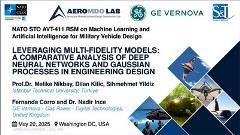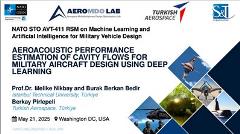ITU AeroMDO Lab presented two papers at the NATO Science & Technology Organization AVT‑411 Research Specialists Meeting on Machine Learning and Artificial Intelligence for Military Vehicle Design held at The George Washington University in Washington, DC: on May 21, 2025,
ITU AeroMDO Lab presented two papers at the NATO Science & Technology Organization AVT‑411 Research Specialists Meeting on Machine Learning and Artificial Intelligence for Military Vehicle Design held at The George Washington University in Washington, DC: on May 21, 2025, “Aeroacoustic Performance Estimation of Cavity Flows for Military Aircraft Design Using Deep Learning,” co‑authored by Prof. Dr. Melike Nikbay, Burak Berkan Bedir and Berkay Pirlepeli, which employs deep‑learning–assisted surrogate modeling to reduce the simulation time and computational resources required by RANS, DES and LES for cavity‑induced aeroacoustic flows; and on May 20, 2025, “Leveraging multifidelity models: A comparative analysis of deep neural networks and Gaussian processes in engineering design,” co‑authored by Prof. Dr. Melike Nikbay, Dilan Kilic, Sihmehmet Yildiz, Maria Fernanda Corro and Dr. Nadir Ince, which evaluates multi‑fidelity deep neural networks against traditional cokriging and partial least squares–enhanced cokriging on complex engineering problems to quantify computational savings and guide the integration of these surrogates into design optimization and uncertainty quantification analyses.
Paper Presentations
- B. Pirlepeli, B.B. Bedir & M. Nikbay, “Aeroacoustic Performance Estimation of Cavity Flows for Military Aircraft Design using Deep Learning”
- S. Yıldız, D. Kılıç, M. Nikbay, M.F. Corro & N. Ince, “Leveraging Multi-Fidelity Models: A Comparative Analysis of Deep Neural Networks and Gaussian Processes in Engineering Design”

